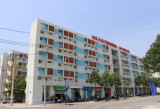Prime Minister chairs fifth Vietnam Economic Forum
Prime Minister Pham Minh Chinh chaired the plenary session of the fifth Vietnam Economic Forum in Hanoi on December 17.
.jpg) At the event
At the event
The event was held both online and in-person formats, with over 1,000 delegates taking part.
Before the plenary session, four thematic discussions were co-chaired by leaders of ministries and agencies, featuring the topics of creating development space and new economic growth drivers, healthy financial and real estate markets for rapid and sustainable economic development, removing bottlenecks in public investment and capital for enterprises, ensuring social welfare and employment in combination with 2023 economic development.
Speaking at the session, Chairman of the Party Central Committee’s Economic Commission Tran Tuan Anh said the event will point out what Vietnam needs to do to maintain macro-economic stability and ensure major balances of the economy; identify the right opportunities, difficulties and challenges; suggest response policies and guidelines to step up industrialistion and modernisation, and fulfilling national development goals till 2030 with a vision to 2045 set in the Resolution adopted by the 13th National Party Congress and other resolutions.
Reporting Vietnam’s economic performance 2022 and orientations to 2023, Minister of Planning and Investment Nguyen Chi Dung said with COVID-19 under control, Vietnam’s inflation stood at 3.02% in January-November and is below 4% for the whole of this year. Industrial production went up 8.6% during the period while the total retail of goods and services rose by 20.5%. The total number of newly-established firms surged by 33.2% annually to 195,000. The foreign direct investment hit a five-year record to 19.68 billion USD, up 15.1%.
Apart from achievements in social welfare, anti-corruption, national defence-security, external affairs and global integration, delegates raised concern over inflation pressure due to external uncertainties, low labour productivity, slow disbursement of public investment capital; risks in securities, corporate bond and real estate markets; high input costs and shortage of materials, among others.
Dung said next year, Vietnam will encounter difficulties and challenges in meeting development goals amid fluctuations in the world. Hence, it requires not only the unanimity, efforts and determination of the entire political system, people and businesses to perform tasks but also support from the global community, governments, international organisations, scientists and experts at home and abroad./.
VNA
 Enterprises assisted to enhance product quality and elevate competitiveness
Enterprises assisted to enhance product quality and elevate competitiveness
 Processing and manufacturing industry accounts for over 91% of foreign investment capital
Processing and manufacturing industry accounts for over 91% of foreign investment capital
 Strengthening removal of obstacles to promote socio-economic development
Strengthening removal of obstacles to promote socio-economic development
 Proactively facilitating enterprises’ development
Proactively facilitating enterprises’ development
 Binh Duong completes infrastructure to support its efforts in investment attraction
Binh Duong completes infrastructure to support its efforts in investment attraction
 Commodities well prepared for upcoming Tet 2025
Commodities well prepared for upcoming Tet 2025
 Vietnam sees opportunities to attract investments in electronics support industries
Vietnam sees opportunities to attract investments in electronics support industries
 Six-house cooperation supports farmers to increase the value of agricultural products
Six-house cooperation supports farmers to increase the value of agricultural products
 Ips achieve key targets ahead of schedule
Ips achieve key targets ahead of schedule
 Enterprises promote cooperation in green transformation
Enterprises promote cooperation in green transformation







